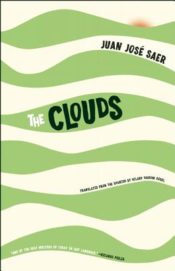 Juan José Saer
Juan José Saer
Translated by Hilary Vaughn Dobel
Open Letter ($14.95)
by Erik Noonan
For the most part, contemporary fiction consists of dreams just about to come true, except that now and then a voice interrupts our slumber party, to invoke the tradition of Don Quixote and Lazarillo de Tormes. In this spirit, the anglophone reader who craves some profondeur in her divertissement will take pleasure in a new translation of The Clouds, a 1997 novel about madness in a millennial wasteland by Argentine author Juan José Saer (1937-2005).
His wife and sons having gone ahead to the seaside, Pinchón Garay, a Parisian academic from an unnamed city in the Southern Hemisphere, receives a disk from an old friend containing a transcription of an 1835 manuscript passed on to her by an archivist, and sits at his computer to read. The narrative relates a journey from Santa Fé to Buenos Aires, undertaken in August 1804 by a psychiatrist named Dr. Real, his guide Osuna, and five people who will become the inaugural cohort at Las Tres Acacias, an insane asylum soon to open at their destination: Prudencio Parra, who has gone mute and concentrates all his energy in a balled-up fist; Sister Teresita, a nun who has been reformed by the ladies of the evening she set out to reform; Troncoso, an aristocrat more at home in the company of the elemental forces of the universe than in society; Juan Verde, who crams everything he wants to say into the phrase Morning, noon, and night and never says anything else; and Juan's little brother, Verdecito, who expresses himself with every vocal sound imaginable except articulate speech. Beset by the terrible heat of the llano, the interpersonal dynamics of the group, their own maladies, and a gang of marauders led by the dreaded violinist-bandit Josesito, the little caravan makes its way to the closing pages of the story, whereupon the weather breaks, in the form of the clouds of the title, followed closely by a wildfire that lays the countryside to waste while the travelers take refuge in a lake until the blaze surrounds and passes them.
In this fiction, a doctor, the safeguard of the community's health, is the transmitter of civilization. The ruling passion of our narrator is bureaucratic—this is not an intrepid adventurer, but an efficient administrator—yet the chief pleasure of the book is Dr. Real's subtle commentary upon the action. Fearing public exposure as a psychiatric patient, Troncoso only ceases his antics when the doctor appears, while the latter remarks: "By revealing that connection to reality, he eased my concern, though only to an extent; experience has generally proven that, beneath that deceptive meekness, frenzy often grows impatient." When some local prostitutes adopt an adversarial stance toward the hypersexual Teresita, Real observes that "what the women took as an affront on the little nun's part, was, in a way, an homage she paid them." Reflecting on human behavior, Real reveals himself to be a naturalist: "A group of butterflies that all unmistakably perform the same motion at the same time puts our categories of individual and species to shame." In Saer's neoclassical prose, the simultaneity of the themes—life as a mere sojourn in the midst of transience, sanity as fortitude before dissolution, the cultivation of habit as the survival of culture—recapitulates the balance of the diction (epithets qualifying substantives) and the complexity of the syntax (subordinate clauses qualifying main ones), and this architectonics traces a line at the edge of barbarity, somewhat like the one that was thought to exist during the Enlightenment, but did not.
The trek of this crazy crew, a society in miniature, is an allegory for the transformations of a post-colonial, post-global Hispanosphere, gone astray in a wilderness of totalitarian regimes, corrupt democracies, and popular revolts, monsters born from the union of Evil and Reason. In Hilary Vaugn Dobel's excellent English version of the text, Juan José Saer visits us from an era that is like and unlike our own: "We were the effervescence of what lived," he writes, "things that vanish, in the very instant they arise, to that place we call the past, where no one ever goes," except sometimes in a novel.
